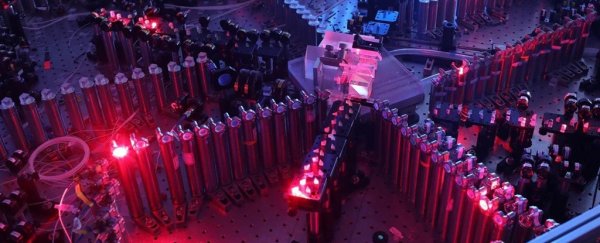A team of Chinese scientists have developed the most powerful quantum computer in the world, capable of performing at least one task 100 trillion times faster than the world's fastest supercomputers.
In 2019, Google said it had built the first machine to achieve "quantum supremacy," the first to outperform the world's best supercomputers at quantum calculation, Live Science previously reported. (IBM disputed Google's claim at the time.)
The Chinese team, based primarily at the University of Science and Technology of China in Hefei, reported their quantum computer, named Jiuzhang, is 10 billion times faster than Google's. A description of Jiuzhang and its feat of calculation was published December 3 in the journal Science.
Assuming both claims hold up, Jiuzhang would be the second quantum computer to achieve quantum supremacy anywhere in the world.
China has invested heavily in quantum computing, with Xi Jinping's government spending US$10 billion on the country's National Laboratory for Quantum Information Sciences, NDTV reported.
The country is also a world leader in quantum networking, where data encoded using quantum mechanics is transmitted across great distances, as Live Science has reported.
Quantum computers can exploit the unusual mathematics governing the quantum world to outperform classical computers on certain tasks, as Live Science reported.
Where classical computers perform calculations using bits, which can have one of two states (typically represented by a 1 or a 0), quantum bits, or qubits, can exist in many states simultaneously. This allows them to solve problems more quickly than classical computers.
But while the theories predicting that quantum computing would beat classical computing have been around for decades, building practical quantum computers has proved much more challenging.
The Chinese computer makes its calculations (limited to particular questions about the behavior of light particles) using optical circuits.
Google's device, Sycamore, uses superconducting materials on a chip and more nearly resembles the basic structure of classical computers.
Neither would be particularly useful on its own as a computer, and the Chinese device was built to solve just one type of problem.
To test Jiuzhang, the researchers assigned it a "Gaussian boson sampling" (GBS) task, where the computer calculates the output of a complex circuit that uses light. That output is expressed as a list of numbers. (Light is made of particles known as photons, which belongs to a category of particles known as bosons.)
Success is measured in terms of number of photons detected. Jiuzhang, which itself is an optical circuit, detected a maximum of 76 photons in one test and an average of 43 across several tests.
Its calculation time to produce the list of numbers for each experimental run was about 200 seconds, while the fastest Chinese supercomputer, TaihuLight, would have taken 2.5 billion years to arrive at the same result.
That suggests the quantum computer can do GBS 100 trillion times faster than a classical supercomputer.
This doesn't mean that China has a fully practical quantum computer yet, according to Xinhua. China's device is specialized, and mostly useful as a tool for doing GBS. But it's a major milestone on the way there.
This article was originally published by Live Science. Read the original article here.
